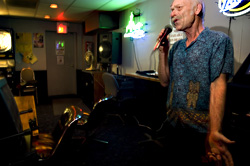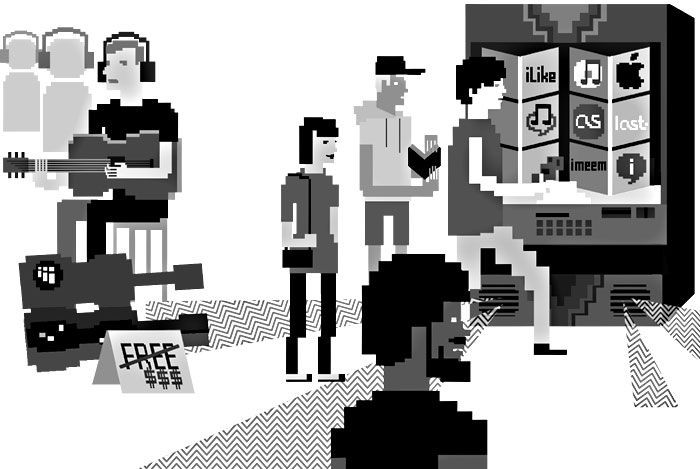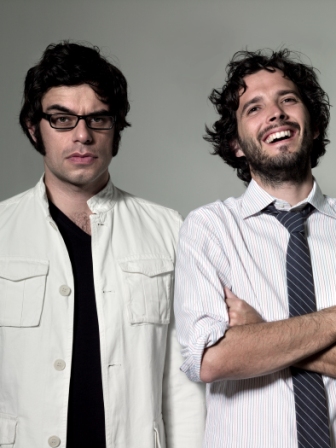I reached up for the stars and had all of this stardust fall on me. It’s fate, is what it is. True fate is what led Jubilee Days to what it is today,” says Larry Winkler, sitting back to take a sip of Coke. The White Center Eagles Club is dark inside, save for the video poker and flashes of a track meet from a nearby flat-screen TV, but Winkler’s tired eyes are glistening. Now, when a man who’ll be singing onstage in a few weeks starts talking about how fate brought him there, the temptation is to laugh.
But then you find out that Winkler’s talking about Jubilee Days, White Center’s annual community festival replete with a golf tournament, carnival rides, and a parade. You find out that it’s now in its 87th year and that he’s been a lifelong attendee. And you start to think that the 58-year-old lifelong White Center resident—his white mustache and ring of hair topping a gray and maroon polo shirt with a ubiquitous Jubilee Days pin—may be as right as he is prone to hyperbole.
It started six years ago. Winkler’s wife of 21 years, Kay, passed away. A year later, her biological mother died. About two years after that, her adoptive mother passed away, too; last week, his own mother died. “So they’re all gone,” he says of the women in his life. “But those are all life steps.”
Winkler proceeded to recede socially. He rarely left the house except to do the job he’s held for the past 20 years, working as a letter carrier for the Westwood Post Office. But before long, his daughter, son, and two grandkids moved in and prevented further cocooning by pushing him out to karaoke night at Roxbury Lanes.
Though he was obviously heartbroken, Winkler couldn’t help falling in love again; first, with karaoke. “I like singing old songs, and slow songs, and love songs. The songs that feel good to me.” Nor could Winkler stay away from the ladies; the one who grabbed both his heart and loyalty, Connie, ran the karaoke nights at Roxbury Lanes. “We stayed with her for a year and a half,” he says of the time spent regularly drinking Cokes and singing classics. “And then, she just disappeared! But she came up here,” he says, grandly gesturing around him at the White Center Eagles Club.
Winkler needed to be a member to attend Eagles’ functions. He’d been asked to join back in 1969, when an Eagle approached him on the White Center Roller Rink, but the then-recent high school grad didn’t see it as his thing. This time he felt differently, and his trajectory is proof. There’s a photo of him, dapper in a firefighters’ suit, in the portrait-lined hall of former presidents marking his 2002–’03 tenure.
Two years ago Winkler retired as a volunteer from the North Highline fire department and further entrenched his life in music. “I started taking piano and singing lessons. I was no longer fire fighting, so I had the time.” Soon after taking lessons from a local pastor, he heard but one question: “‘Where have you been this entire time?’ he asked. I had to explain that music had only really been a passion of mine for the past few years. Prior to that, it was just through school—the clarinet, saxophone, tuba.”
Music did run in the family: when he was growing up in the ’50s, Winkler’s mother was a singer in the local barbershop group Sweet Adeline. “Am I a spin-off of my mom? No, I don’t think so,” he says. When pressed for a specific favorite song of his, he talks of watching TV as a small child, and being moved by Jiminy Cricket’s “When You Wish Upon a Star.”
“I remember thinking how beautiful that song was…the passion’s there. It grew in me, and it didn’t blossom until I was ready for it.”
Winkler’s passion for karaoke kept blossoming until last December, when he first proposed the idea of hosting a karaoke contest to Steve Teasley, then Jubilee Days’ entertainment chair. And Teasley loved it. “Not only did it take up stage time, but you didn’t have to pay for it,” he says. Winkler’s glorious moment was thusly set:onstage hosting the karaoke contest, leading what he loves best for his entire hometown to see. This thumbs-up led Winkler—whose requests for time off each year must be made in January—to plan this year’s vacation time around Jubilee Days.
Shortly afterward, Jubilee Days chair Scott LaVielle was promoted to fire chief of North Highline and, according to Winkler, was discouraged from “playing around with stuff like” Jubilee Days. Once that happened, says Winkler, two of the other Jubilee Days guys—chiropractor Christopher Hill and insurance agent Teasley—”decided to toss in the towel.” Not long after, the West Seattle Herald ran a story announcing the death of Jubilee Days.
Fearing for the future of his karaoke contest, Winkler took action and called Dr. Hill. “I said, ‘I want to get these guys onstage. What’s it going to take to make Jubilee Days happen this year?'” Winkler went to a White Center Eagles meeting in February to voice the need for replacement board members.
“I said, they need help!
“And they said, ‘good job, Larry—you’re the chairman.'”
His phone rings midstory, and he’s soon explaining to another member of the committee that it’s 4 p.m., and the pamphlet-printing deadline isn’t for another two hours. It’s apparent that all of Winkler’s skills—computers, people, karaoke madness, booking bands in line with the White Center aesthetic—are a perfect match for the requirements of the job. Winkler’s version of Jubilee Days does include a lot of entertainment, including swing band Route 66, female folkster Shakeh, the Zumani dance troupe, and steel drummer Ian Dobson. Winkler’s experience booking 10 bands a year for the White Center Eagles paid off, and he also received help from King County’s public arts organization 4Culture.
Between all of the festival’s myriad demands, Winkler’s dream of hosting a karaoke contest was nixed. “It was so overwhelming that I had to stop the karaoke party to get the whole thing in there—not just the entertainment, but the parade, golf tournament…” Winkler even designed the festival’s Web page (yes, that’s him singing the song on jubileedays.org) and worked to secure sponsorships.
But the stage never left Winkler’s eye. While recently discussing set-up times with the equipment manager, he noted that the stage was being erected well before the 11:30 a.m. slot for the opening band. The consummate businessman, he mentioned a desire to personally ensure that the event would run smoothly. “I told him I kind of wanted to do a sound check with my keyboard.
“He just kind of laughed at me and said, ‘Larry, you’re paying for the thing. You can do whatever you want to do. Just don’t break it.'”
Winkler leans in and widens his eyes. He can, and is, going to do what he wants this Saturday. “It’s an unannounced, unscheduled recital, one hour before the start of”—he opens his hands wide and shakes them—”Jubilee Days!”








